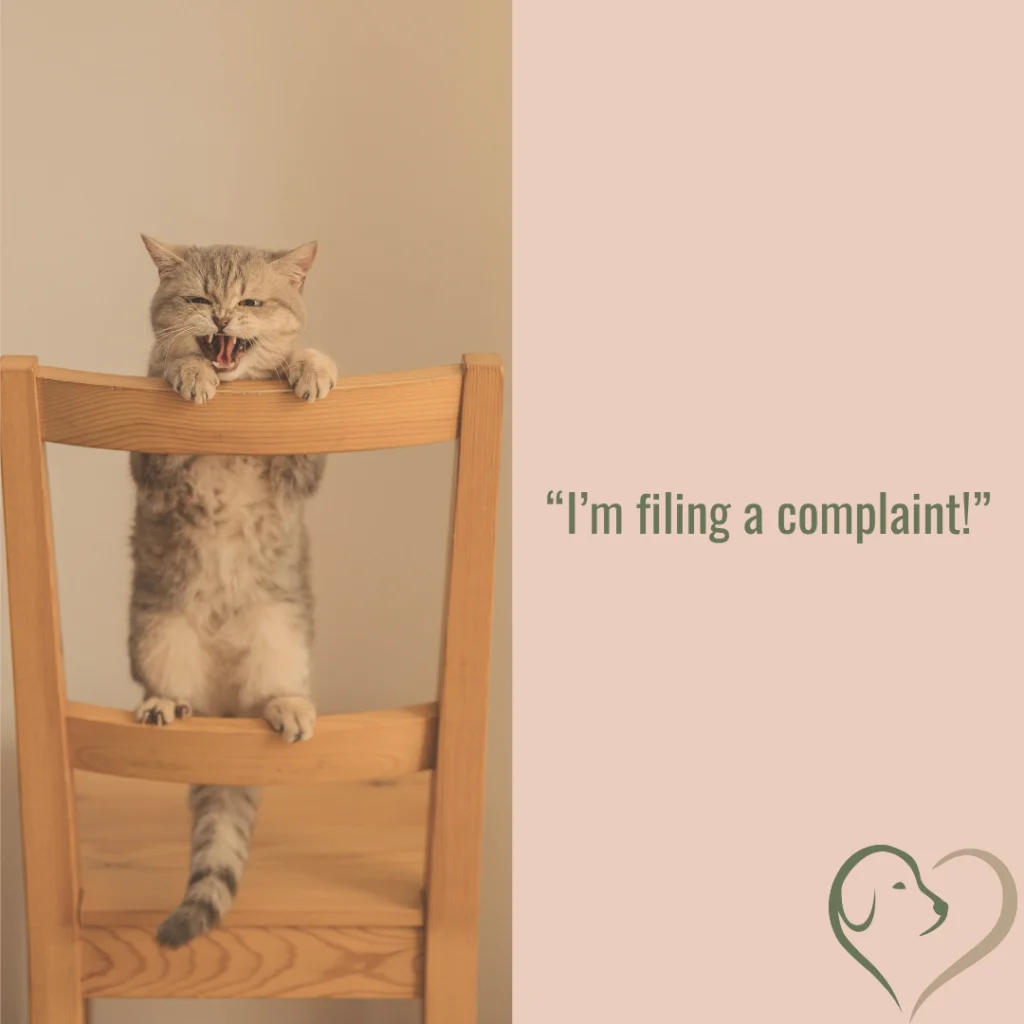In our previous article, we explored the responsibilities of both the veterinary team and the pet owner when it comes to the health care of our beloved furry companions. But what happens when someone on the veterinary team fails to fulfill their responsibilities?

Each province has a licensing board that protects the public’s interests. These boards issue licenses to veterinarians and veterinary hospitals, ensuring that these professionals meet the necessary standards. They also provide a formal complaints process for clients who feel a veterinarian has done something wrong. Complaints are investigated to determine whether the veterinarian did or did not meet their obligations.
Valid reasons to file a formal complaint with the board might include negligence that results in the prolonged illness or death of a pet. This would mean that the veterinarian failed to address elements within their control or did not follow reasonable, evidence-based processes, leading to harm or suffering. For example, this could include situations where a doctor did not provide adequate, up-to-date pain control for a surgical procedure. Or maybe they failed to detect and address a heart murmur in a surgical patient, proceeding with the operation without informing the owner of risks or options.
A more rare but obvious reason for a complaint would be blatant abuse or mishandling of animals, causing them harm. Thankfully, these instances are extremely rare, and most pet owners and veterinary staff will never witness such events.
However, many reasons for complaints are not always easy to decipher because the outcomes may be similar. For instance, the death of a pet during anesthesia isn’t necessarily due to negligence on the part of the veterinary team. The risk during anesthesia is never zero. This is why having a trusting relationship with your veterinarian and the hospital is so important. Trust goes both ways: you are trusting them with the life and health of your pet, and they are trusting you to understand and comply with recommendations, as well as communicate effectively about any concerns. (See our article on responsibility here.)
Whenever a client loses a pet suddenly, the first stage of grief—anger—can be overwhelming. Despite the best efforts of the veterinary community, bad outcomes do happen. Pets get sicker, families become upset, and sometimes patients pass away. This is, unfortunately, part of the nature of veterinary work—dealing with sick animals and families in times of need.
It’s important to note that not every negative experience warrants a formal complaint. For instance, feeling upset about the cost or outcome of care is not a valid reason. Sometimes clients may threaten to file a complaint because they couldn’t afford treatment for their pet, but this isn’t grounds for action against the veterinarian. In times of stress, it can be difficult for pet owners to sort through complex emotions, but looking for someone to blame isn’t the way to partner with the veterinary team or move forward.
Unfortunately, many complaints arise for these types of reasons, and the toll this takes on veterinarians is significant. The complaints process can make veterinarians feel like their entire career—the result of years of education and practice—is at risk. The anxiety of second-guessing everything they’ve done on a case can become overwhelming. In extreme cases, some veterinarians question whether they should even continue in the profession.
There was a recent instance at a local veterinary hospital that highlights these issues. A woman brought her elderly dog in for an assessment because she was worried—her beloved pet had not been eating and had been lethargic for the past few days. The veterinary team performed a thorough examination and consultation with both the dog and the owner present. The veterinarian expressed concern over the dog’s condition and the need for diagnostics to determine the best course of treatment. Unfortunately, the woman was worried about the cost of care.
The veterinary team empathetically presented a range of options, from comprehensive treatment to more conservative (and less costly) alternatives, in an effort to accommodate the owner’s situation. Ultimately, the client chose to seek a second opinion from a friend who was also a veterinarian but located further away. The veterinary team supported this decision, as their primary concern was ensuring the dog received care, and they sympathized with the clearly worried owner.
However, moments after leaving the hospital, the client’s husband, who had not been present for the appointment, called the clinic. He expressed his anger and stated that he would be filing a formal complaint against the veterinarian for how she had treated his wife.
It is clear that this couple loved their dog, and it is also clear that they were not prepared to hear that their beloved companion was ill enough to require intervention. But is there grounds for a complaint here? Did the veterinarian and her team fail in their responsibilities?
The facts show that the team performed a thorough exam and consultation. They made recommendations based on their findings and the owner’s expressed concerns. They were kind, empathetic, and offered a treatment plan that accommodated the owner’s financial limitations. They did not force the client into making a decision, and they complied with the request to transfer the dog’s records, even though they wanted to help the pet immediately.
Given these facts, it’s difficult to understand what the husband, who was not present for the appointment, believed the veterinarian had done wrong.
“Frustration, fear, or disappointment should not be the driving force behind a formal complaint.”
Before considering a formal complaint, it’s important to take a step back and ask whether the veterinary team was focused on reducing your pet’s suffering or if their actions truly reflected negligence. Frustration, fear, or disappointment should not be the driving force behind a formal complaint.
Working in the veterinary industry can often feel like a thankless job. While the anger and frustration of clients can sometimes lead to formal complaints, this often drowns out any gratitude or appreciation the veterinary team might receive. When a loss occurs, it takes an emotional toll on the team, who often feel the loss alongside the pet owner. Veterinarians come to work every day wanting to help and heal their patients, and it’s devastating for them when a complaint questions their dedication and efforts.
